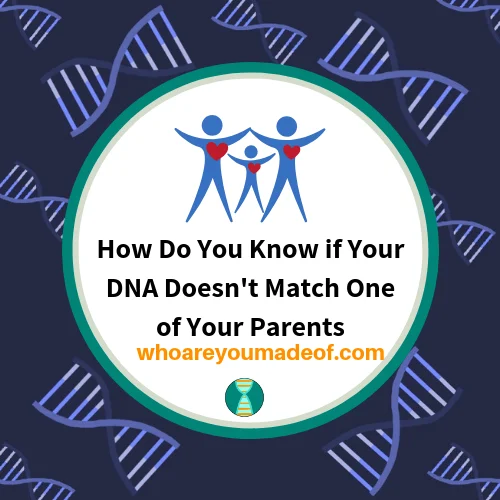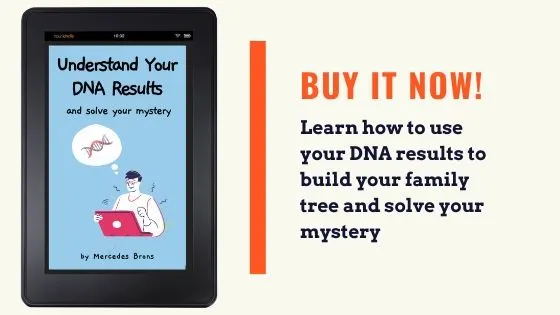Do you want to know if there is a way to determine whether you are biologically related to your parents using your DNA matches? Even if your parents can’t take a DNA test, there are a few simple ways to find out if your DNA matches one or both of your parents.
Note: Naturally, the most reliable way to find out if your DNA matches both of your parents would be to have them take a DNA test. This article is written for those people who are unable to do this, for whatever reason applies to their particular situation.

When I was thinking about writing this post, I decided that I would make it a point to mention that whether or not our DNA matches our family, it doesn’t have to affect our relationships and how we feel about each other.
My husband was raised by his adoptive family from the age of about five years old, and I’ve learned from watching how he cares for his parents and siblings – and how they care for him – that DNA is not the most important element of a family relationship.
With that important bit of discussion out of the way, I would add that I do understand why people do wonder if they are biologically related to the parents who raised them, and the families of those parents.
For many of us, the story of our origins is an important part of how we define ourselves. For others, building an accurate genetic family tree is a priority.
So, regardless of your reasons for wondering, in this post you will learn some simple ways to spot whether your DNA matches the families of both of your parents.
But first…
Your ethnicity estimate can’t help you figure out if your DNA matches your parents or their families
Ethnicity estimates are the most popular elements of DNA results, and so they get a disproportionate level of attention. If your DNA ethnicity estimate (or ancestry composition report) doesn’t match what you know about your family’s history, does it mean that you’ve discovered some sort of secret about your origins?
I can say with absolute certainty that you should never, ever use your ethnicity estimate to decide that you might not be related to, or descended from, a particular relative.
Ethnicity estimates cannot help determine paternity, or provide evidence that you are not descended from a particular grandparent, or guarantee any other specific information about our heritage.
Check out my post about what ethnicity estimates really are to learn more about how ethnicity is inherited and what we can glean from them.
Do you have close relatives that could do a DNA test or that have already tested?
If you have living relatives that are relatively closely related to you, their DNA results can provide insight as to whether your DNA would match your parents. Even though we don’t share DNA with all of our relatives, we will share DNA with our close family.
Anyone who is related to you at a second cousin distance or closer will show up on your DNA match list.
Close relatives who can do a DNA test to help you determine that you are biologically descended from both of your parents are:
- Siblings
- Aunts and uncles
- Grandparents
- Great-grandparents
- First cousins (including first cousins once-removed)
- Second cousins
Just having your close relative show up on your match list isn’t really all of the information that you need, however. You’ll need to figure out how much DNA you share with your relative, and whether or not it falls within the expected range of shared DNA for your relationship distance.
In my post, Beginner’s Guide to Shared Centimorgans, you can learn about how to use shared DNA information to estimate your relationship to a match. In addition, you’ll find Blaine Bettinger’s helpful shared DNA chart that can help you see how much DNA people with dozens of relationship types typically share.
Have you built a family tree for yourself?
If you don’t have any close family that could take a DNA test to help you verify your ancestry, then you are going to have to use information from your DNA matches in order to figure out if your DNA matches your parents’ extended families (and thus, would also match your parents).
In order to make the best use of your DNA matches to verify (or dispute, if that’s your goal) your ancestry, I recommend that you research your family tree back to at least your great-great grandparents on ALL lines if your family tree.
This means that you should identify the names and places of birth of all sixteen of your great-great grandparents.
While you are completing this step, you might want to consider uploading your DNA to as many websites as possible in order to get as many DNA matches as you can. This will be useful when you are done building your family tree.
Do you have close DNA matches that don’t seem to fit in to your known family tree?
So, what does it mean if you have a few close DNA matches that don’t seem to line up with what you know about your family tree? How do you know if you are really in their known tree, or they are really in your known tree?
In other words, whose tree is wrong?
(For the record, I never recommend sending a match a message letting them know that their tree is wrong. Especially a close match – it’s not a great way to get a relationship started!)
This is where more distant DNA matches come in handy. If you have a healthy DNA match list with lots of 2nd-4th cousin DNA matches, then you should be able to tease out if they belong in your tree, or vice versa.
Check carefully through the family trees of your first, second, and third cousin DNA matches. Most likely, you will begin to spot patterns and realize that these DNA matches are descendants of your grandparents, great-grandparents, great-great grandparents, and even great-great-great grandparents.
Aren’t you glad that you took the time to built a small family tree before you set out on this journey?
Conclusion
I hope that this post has helped give you the tools and information necessary to help you determine that you are descended from your parents. If you have any questions about something that you read in this post, or would like to share your own experience about researching your biological family, I would love to hear from you in the comments below.
Thanks for stopping by today!


Suzanne G McClendon
Sunday 21st of November 2021
I took my AncestryDNA test in the fall of 2016. There were a lot of names that I didn't recognize, but that didn't set off any red flags for me. I didn't do much with the match list at that point. Then, my little sister took the AncestryDNA test in the fall of 2018 and it showed us to be half-sisters. I paid attention to my match list then. I was sure that she was the one with a different daddy because of our recently departed mother's life choices. But, little sister had matches to Daddy's 1C1Rs and 2Cs....and I did. I was the outsider. I paid attention, obsessively, to my match list then.
My mother was in denial and stopped talking to me.
Never underestimate the matches with tiny trees. I got the ball rolling with a tree of only 3 people and two of those were marked private. The one that was open had a unique (or so I thought!) name. His first name was Elvis. I had only ever heard of one other Elvis. Apparently, the name Elvis was more common than I realized because I've run into it several times now. Anyway, I built out that man's tree and found he had common ancestors with other close, unknown matches. With the help of a man who turned out to be a 3C1R, we pinned down my 3rd great-grandparents, though didn't know yet whether they were through Grandmother or Grandfather.
Another helper came along, and we played around with different tree layouts with the growing list of common ancestor couples. One day the most amazing thing happened! I added someone to the tree and all of a sudden both sides of my unknown match list were connected. I literally saw it come together right there on my screen. I couldn't breathe! I was looking at my unknown to me paternal grandparents! After 8 months of non-stop searching, I knew who my grandparents that I had been robbed of were.
They had three sons, one my mother's age, one 2 years younger, and one still a young teen (about 13) when I was conceived. We ruled out the youngest boy. Also, the two oldest had been in the Navy, as were most of my uncles. My mother's oldest brother was always bringing guys home to meet his sisters.
It took another 8 months to get these guys contacted and consent to take the DNA tests. The first one to test, a very kind man, turned out to be my uncle. He's the one that is my mother's age. I asked him if his brother would agree to test. He contacted him right away and got agreement to test. The guy that is two years younger than my mother turned out to be my biological father. So, I'm the product of an apparently irresistible sailor liaison.
My daddy, the man who raised me, sacrificed for me, loved me completely, never knew that I was not his biological child. He died in 2012, never knowing. While I miss my daddy more than I can ever express, I am glad that he was spared this awful revelation.
When it first became clear that I was not his child, it sent me into an emotional journey that I wouldn't wish on even my worst enemy. I had a nervous breakdown, went into shock, was, at one point, suicidal....the works. The suicidal plan wasn't so much because Daddy was not my father, but because of accusations of familial rape against my mother.
It took 4 months to prove that I was not my maternal grandpa's child. With that off of nerves, I was able to focus and learn and do what I needed to do to sort out my match list and find my biological father.
29 Apr 2020, the real me was born. I learned my true identity. I learned who my biological father is.
This has to be the worst type of identity theft there is. Money lost to the typical identity theft can be recovered (maybe), but time lost with a father and grandparents that I never knew, always feeling like an outsider during childhood, the loathing of a mother...those are things that can never be regained nor reconciled.
I was robbed of me.
Dee
Sunday 7th of May 2023
@Suzanne G McClendon, My heart goes out to you and I’m so sorry that you have experienced all of this. I have a similar story and grew up feeling like the outcast and that I didn’t belong anywhere. I understand the identity theft in which you speak and I also feel robbed. I’m still searching for my biological father and family. Although I hate to hear about the pain you’ve had, I’m thankful I was able to read part of your story. It gives me hope that I too will be able to find what I’m looking for. Thank you! I wish you much peace and happiness!